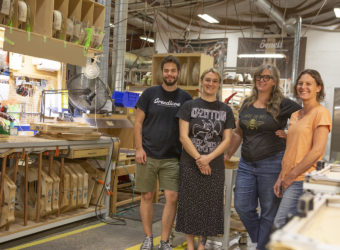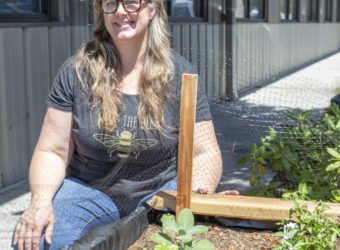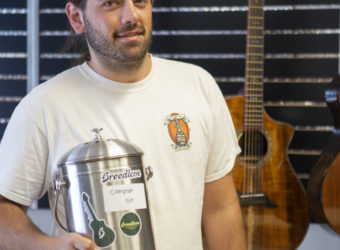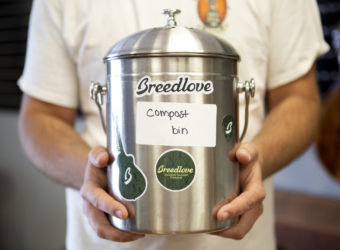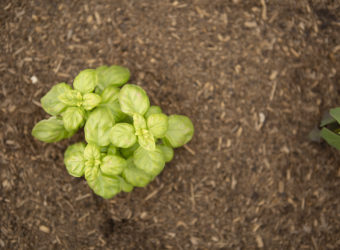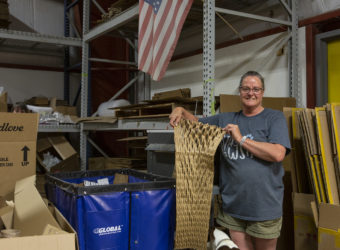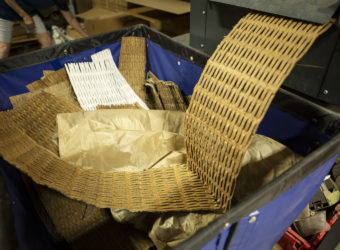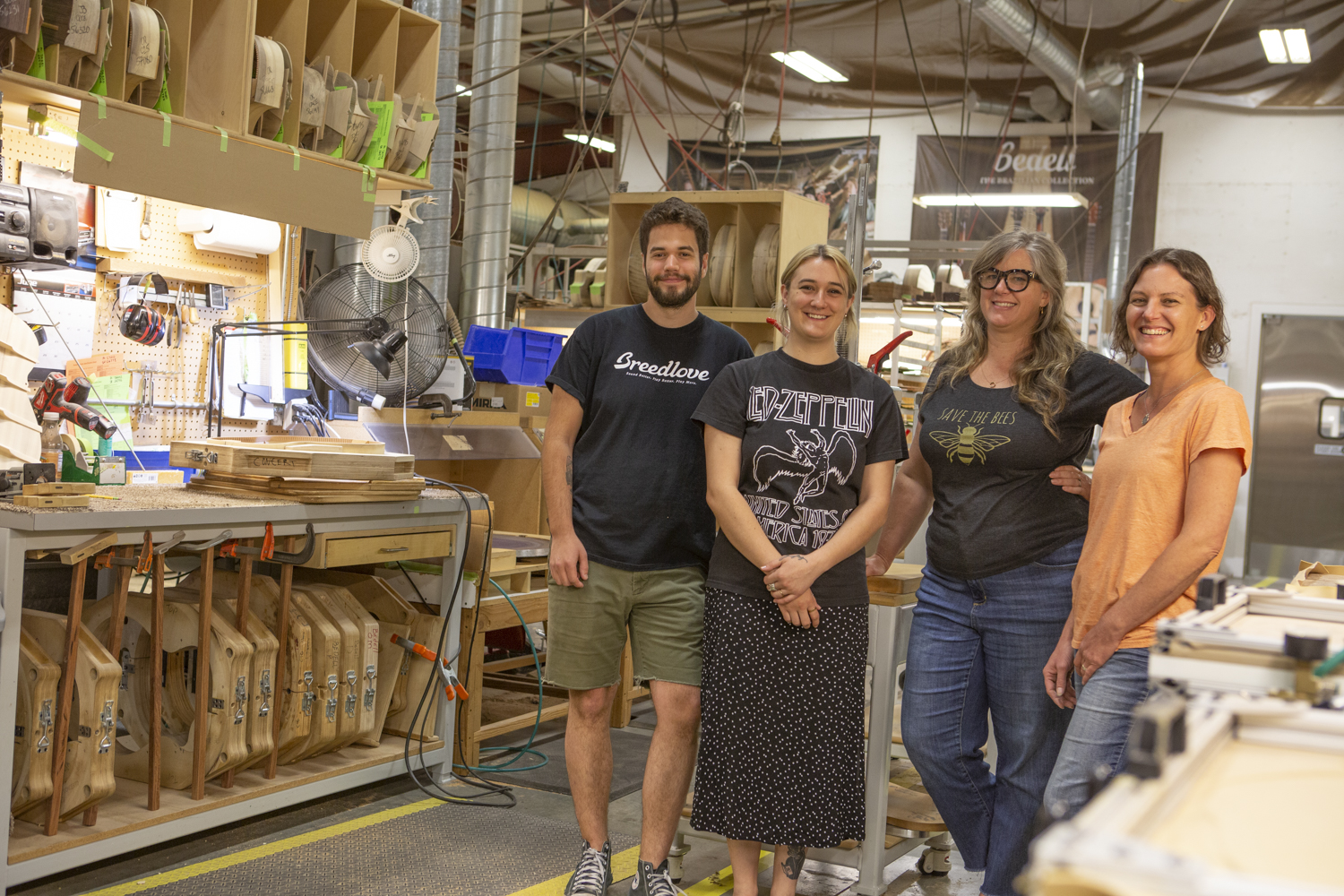
Breedlove employees come together to meet the challenge of making the company as environmentally conscious as its guitars are sonically and aesthetically beautiful
How does a company evolve from creating the best-playing, best-sounding acoustic guitars around to crafting those same beautiful instruments with a process that’s cleaner and greener, more sustainable and traceable?
At Breedlove headquarters in Bend, Oregon, employees across the company are taking steps, large and small, to make the company work better and smarter — and more environmentally conscious, with the future of the planet in mind. One of these is Erik Has-Ellison, who leads Made in Bend production of Breedlove guitars.
Has-Ellison — who got his start working with mandolin master Ryan Fish six years ago — has helped inspire his co-workers to lean green, even with the little things. He recently made a plea for all workers across the organization to switch from paper paystubs to simple e-mail documents.
“That’s just one little step that we could all take environmentally, by just eliminating something that most of us don’t really need or even look at anymore,” Has-Ellison explains. “With technology today, you can go paperless in lots of ways. That really is the least we can do.”
Breedlove has made progress on such important moves as sealing up its entire 30,000-square-foot facility’s previously energy-seeping seams. But Has-Ellison says that the company should always be looking for more eco-friendly ways to work. “With mass production and the amount of stuff we send out the door every month, it would be good if we can find an alternative to what we’re currently using — whether it’s the plastic bags that we ship guitars in or the shrink wrap that we use for pallets.”
Has-Ellison is also using scrap pallets, saved from shipping, to create raised vegetable beds ready to soak up the high-desert sunshine. “I’m currently working on our dust-collection waste, as well as our wood scraps,” he says. “It would be nice if we can find a way to use all the wood scraps and not throw anything away. Same with dust-collection waste — that’s nearly 100-percent biomass.”
Going Further…
Two Old Hippies had already drastically reduced its paper trail three years ago by adopting fully digital marketing materials, such as catalogs and dealer notices. Procurement/HR Manager Terri Hensley, a long-tenured co-Hippie at 13 years with the company, has helped Has-Ellison get his paperless project started.
When it comes to procurement, Hensley notes that concerns about sustainability and traceability always inform the process. “Before we work with any new wood source,” she says, “Tom Bedell or Angela Christenen will do their due diligence and actually visit the source to make sure not only that it’s legally documented, but also that everyone involved in the process is being treated ethically and no one is being taken advantage of. I think that’s very cool. As far as using sustainable, clear-cut free woods, that is a big thing here. We know exactly where our woods come from.”
A member of the sales team, Erika Mohr is also in charge of Supply Chain Management for Breedlove’s import guitars and ukuleles. She has been with Breedlove for 16 years across two stints with the company. She leads the in-house Sustainability Committee, with its goals including such efforts as improving environmental conditions locally in Bend. The small Pacific Northwest city is known for its easygoing, outdoors-oriented lifestyle, with hiking, biking and skiing among the popular pastimes.
Mohr’s ad-hoc six-person Sustainability Committee also includes Breedlove owner Tom Bedell, as well as Brand Editor Michael Eck. The latter — an admitted “pencil and guitar geek” — recently sent a gross of Palomino-brand FSC-certified ForestChoice pencils to headquarters so that the company could make its writing as sustainable as its luthiery.
Mohr, who has a degree in Environmental Biology from Fort Lewis College in Colorado, says work for the Sustainability Committee is essential. “Because we’ve spent all this time putting together the wood-tracking system, we wanted to bring some of those sustainability conversations to the office space, too, so we can look at how we’re acting day-to-day as a company. How do we become carbon neutral? That is the essence. We also want to apply some of these sustainability practices to our everyday lives with our families here in Central Oregon.”
Development Manager Angela Christensen has been working for Breedlove for almost 20 years. She has deep relationships with suppliers and manufacturers across Europe, Asia and beyond, and she serves as the engine for many of the company’s biggest innovations. Currently, Christiansen sources wood for Breedlove and also designs its guitars. The sourcing and development of the recently announced ECO Collection was one of Christiansen’s pet projects.
“The ECO Collection is super exciting,” Christensen says. “We’ve always had the challenge of making sure that all of our tonewoods are sustainably harvested. We were able to implement that with our Made in Bend models starting in 2013, and we have been sourcing wood that way ever since. Last year, we were able to bring the new Organic Collection to market, which was a huge breakthrough for us in all-solid-wood construction. We knew where all the tonewoods came from, and we were able to carry that sourcing message throughout that product line. That, like the ECO Collection, was a feat, not just because they’re products made in China. It’s not as easy to work with factories anywhere that are willing to source woods this way and to track them.”
Signs of Progress…
At the end of the chain, Warehouse Manager Nancy Inglis, a six-year employee, makes sure all TOH instruments get shipped safely. Everyone in the company knows that it’s one of the most important roles in the process. Inglis is especially fond of a new cardboard converter: “I’ve been wanting it since the day I walked in here! It makes trash into reusable stuff.”
The imposing looking cardboard converter turns old master packing boxes — five-feet long, four-feet tall, two-feet wide — into renewable, reusable, corrugated board, at a current rate of at least six boxes a day. With a smile on her face, Inglis says: “That’s what we use instead of plastic to package our guitars when we ship them.”
With containers arriving regularly from Asia so that each Breedlove guitar can be inspected and set up at the Bend workshop, that amounts to 100-200 master packing boxes monthly. “That’s a lot of cardboard,” Inglis notes. “I’m trying to cut down on our recycling bins outside. We’re just getting started with this machine, but every little bit helps.”
Marketing Director RA Beattie also leads artist relations for Breedlove, having worked in Bend for a dozen years. He has been environmentally proactive by recycling what might otherwise be useless coffee grounds from the break room into rich, potent composting material.
An accomplished independent filmmaker, Beattie has also been putting his artistic aptitude to use by creating distinctive signage for Breedlove retailers by using recycled materials. He makes use of “fallout” — a term of art for otherwise exquisite pieces of top and back wood, such as native Alaskan Sitka spruce or gorgeous Oregon myrtlewood, that for whatever reason have been deemed insufficient for actual Custom Design Center instruments; he uses these fallout pieces to create stunning signs, each one-of-a-kind and environmentally stable.
Whether it’s sourcing sustainable, traceable woods, recycling packaging materials, creating bespoke signage, going paperless or composting coffee grounds, it takes everyone pitching in at a company to make environmental progress. “No one person can do it alone,” Has-Ellison says. “You’ve got to have everyone chipping in and helping out to make a difference.”
